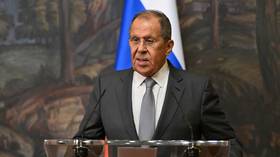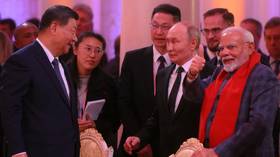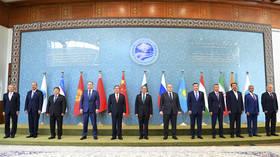Moscow pushes for stronger Pakistan-India teamwork

Russian Foreign Minister Sergey Lavrov has called for closer dialogue between rivalrous neighbors India and Pakistan to combat terrorism and organized crime in the region, and has said ties with Afghanistan should be enhanced, too. The diplomat suggested that the Shanghai Cooperation Organisation (SCO) could be a platform the countries could use to “ask questions, get answers.”
Speaking at a landmark press conference in Moscow on Tuesday, Lavrov highlighted the effectiveness of the SCO’s counterterrorism framework to address security issues in Central and South Asia.
“There is an exchange of information, considering that financing terrorism is linked to drug trafficking and other criminal activities,” he said. The minister also mentioned Russia’s push to establish a unified center within the SCO to combat emerging threats, such as narcotics and human trafficking. He suggested this initiative could materialize during this year.
“It is even more important to strengthen trust within the SCO, including within the format currently working on Afghanistan,” the minister said, noting that efforts against terrorism require uniting efforts between Pakistan, Afghanistan and India.
The SCO was formally established in 2001 by Russia, China, Kazakhstan, Kyrgyzstan, Tajikistan and Uzbekistan as key Eurasian organization focused on security cooperation among its member states. India and Pakistan joined the group in 2017, adding a complex dynamic due to their historically tense relations. Iran, a key regional player and an SCO observer state since 2005, was admitted as a full member in 2023.
Ties between India and Pakistan, each of whom has a claim over Kashmir region, have deteriorated significantly in recent years. Initially, there were hopes for renewed dialogue following Prime Minister Narendra Modi’s rise to power in 2014. However, these prospects largely faded after deadly terrorist attacks at Uri in 2016 and at Pulwama in 2019. Additionally, the Indian government’s revocation of the special status of Jammu and Kashmir state in 2019 further strained bilateral ties, deepening tensions between the two nations.
India’s Minister of External Affairs S. Jaishankar, who visited Islamabad in October last year for the SCO summit, marking the first trip to Pakistan for an Indian foreign minister in nine years, pointed out that the grouping will only succeed if all members are committed to the organisation’s charter, which means “being firm and uncompromising in countering the ‘three evils’” – terrorism, extremism and separatism.
India has repeatedly accused its neighbor of sponsoring cross-border terrorism and insurgency. Pakistan, for its part, has alleged India had been conducting a campaign of covert assassinations on its soil under a pretext of eliminating terrorists.
Despite their differences, both countries participate in SCO’s Regional Anti-Terrorist Structure (RATS), which facilitates the exchange of intelligence and information that assists in counterterrorism.
At the same time, India and Pakistan have been shaping up their engagement with Taliban after it took over power in Afghanistan in 2001 – both New Delhi and Islamabad have strong historical, economic and cultural ties with the conflict-torn country.
Speaking on Tuesday, Lavrov suggested that formats like the SCO Afghan dialogue and the Moscow Format on Afghanistan have proven to be an additional framework, where Pakistan and India, as well as India and China, can communicate more and strive to understand each other better. “We are ready to assist in this in every way possible,” added Lavrov.














